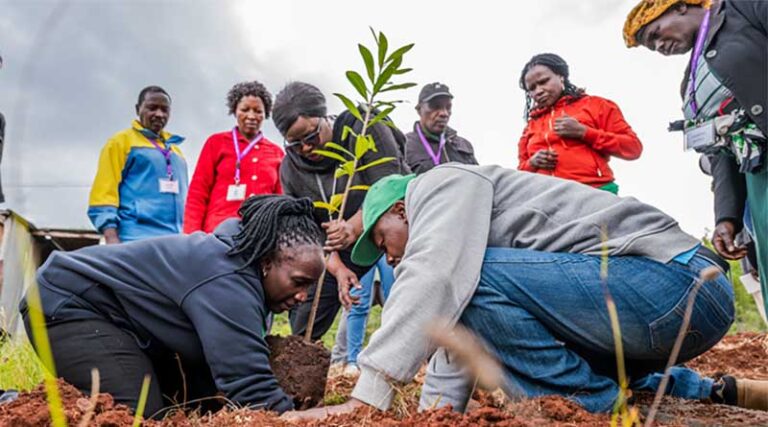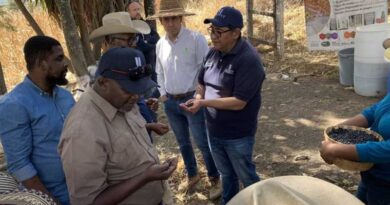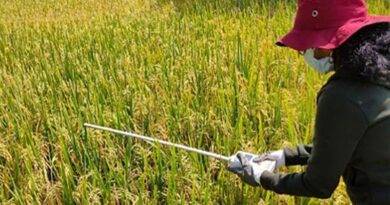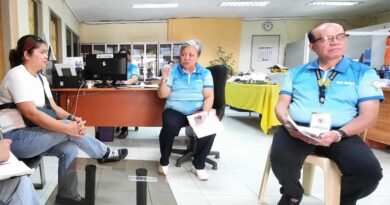
Tree Growing And Agroforestry Training Boost Restoration Efforts In Kenya
25 July 2025, Kenya: Trees offer a wide range of benefits that contribute to improved agricultural productivity and sustainable livelihoods in Kenya, among other African countries. They enrich soils through nitrogen fixation and organic matter, improve water retention, and protect crops from wind and extreme temperatures.
In addition, trees diversify farm income by providing fruits, nuts, timber, and medicinal products, while also supporting livestock with shade and fodder. They also help restore degraded lands, combat desertification, and buffer the effects of climate change. This makes them an essential part of ecological restoration and long-term food security on the continent.
Yet, many farmers are still unable to reap these benefits because they lack access to quality tree-planting material and sufficient knowledge on proper planting methods, in a landscape impacted by changing weather patterns.
The Center for International Forestry Research and World Agroforestry (CIFOR-ICRAF) is addressing these challenges by building the capacity of farmers to implement effective tree-planting, agroforestry and tree-seed practices.
To celebrate World Environment Day 2025, CIFOR-ICRAF convened a training workshop that focused on these topics and benefitted more than 1,000 participants – mainly farmers and Restoration Champions in Laikipia County, Kenya. The event took place through the Quality Tree Seed for Africa project, which is part of TerraFund for AFR100 in partnership with the Bezos Earth Fund.
“This training was aligned with the core mission of the project, which seeks to strengthen access to, and knowledge about, quality tree seed for ecosystem restoration,” says Katrine Gro Friborg, the project manager.
“By equipping farmers with the skills to select, plant, and care for the right trees in the right places, we are laying the foundation for more resilient landscapes, improved livelihoods, and sustainable restoration across Africa.”
While tree planting is a common activity in many parts of Kenya, some farmers still struggle with poor seedling survival due to incorrect planting methods and limited follow-up care. As such, the training placed a strong emphasis on proper site preparation, planting techniques, and aftercare practices.
Farmers were given practical demonstrations on how to dig a suitable planting hole, to position seedlings, to mulch effectively, and to protect young trees from grazing and drought. These lessons were designed not only to help participants plant more trees but also to grow healthier, longer-lasting ones that would thrive even under climate stress.
Agroforestry – the integration of trees into farming systems – was another focus area of the training. Farmers were introduced to the concept of multistorey agroforestry, where trees of different heights and functions are combined with crops or livestock to create diverse and productive landscapes. They also learned how to design their farms to meet multiple needs – such as food, fodder, fuelwood, soil fertility, and income – by combining native and exotic tree species with food crops.
With regard to effective tree-seed practices, farmers were taught dormancy-breaking methods that are tailored to specific seed types to improve their germination rates. Central to this session was the principle of planting the right tree in the right place for the right purpose.
The trainers reinforced this by informing participants about the Africa Tree Finder mobile application – developed by CIFOR-ICRAF – which helps users identify suitable tree species for their specific ecological zones and farming objectives.
The theme of this year’s World Environment Day focused on solutions to plastic pollution. In line with this topic, workshop participants were shown how to reuse polybags and repurpose waste plastic bottles as seedling containers.
They also took part in a group clean-up effort by collecting plastic from fields at the venue of the training. This reinforced the message that restoration must go hand in hand with environmental conservation.
“Many of us have unknowingly used poor planting techniques, like planting tree seedlings with plastic bags or digging shallow holes,” says Catherine Wachira, a farmer in Laikipia County.
“Through the training, we learned improved methods, such as digging holes that are 2 feet wide and 2 feet deep, as well as incorporating biochar and manure to enhance tree survival.”
Diana Njoki, an avocado farmer from the same county, added: “We learned that tree planting and agroforestry are key tools for enhancing food security. For avocado farmers like us, this knowledge helps boost our income and strengthen our local economy.”
“This training has helped reduce ignorance and raise awareness among farmers like me about the importance of using quality tree seeds and diversifying our tree species,” says Susan Njau, a local farmer.
“With this guidance, we are confident that the trees will thrive and serve our communities well.”
The County Government of Laikipia also expressed strong support for the initiative, noting its relevance to local development priorities.
“Laikipia has lost significant forest cover because of charcoal burning, agricultural encroachment, and land degradation,” says Koinange Wahome, Laikipia County secretary. “This poses environmental, economic, health, and food security risks.”
“This training is therefore timely and important as we know that for successful restoration to happen, we need to have functional systems, to train people, to have quality seed, to engage communities, and take follow-up action.”
Also Read: Seizure of 1 Lakh Fake Fertilizer Bags Sparks National Concern Among Indian Farmers
📢 If You’re in Agriculture, Make Sure the Right People Hear Your Story.
From product launches to strategic announcements, Global Agriculture offers unmatched visibility across international agri-business markets. Connect with us at pr@global-agriculture.com to explore editorial and advertising opportunities that reach the right audience, worldwide.






